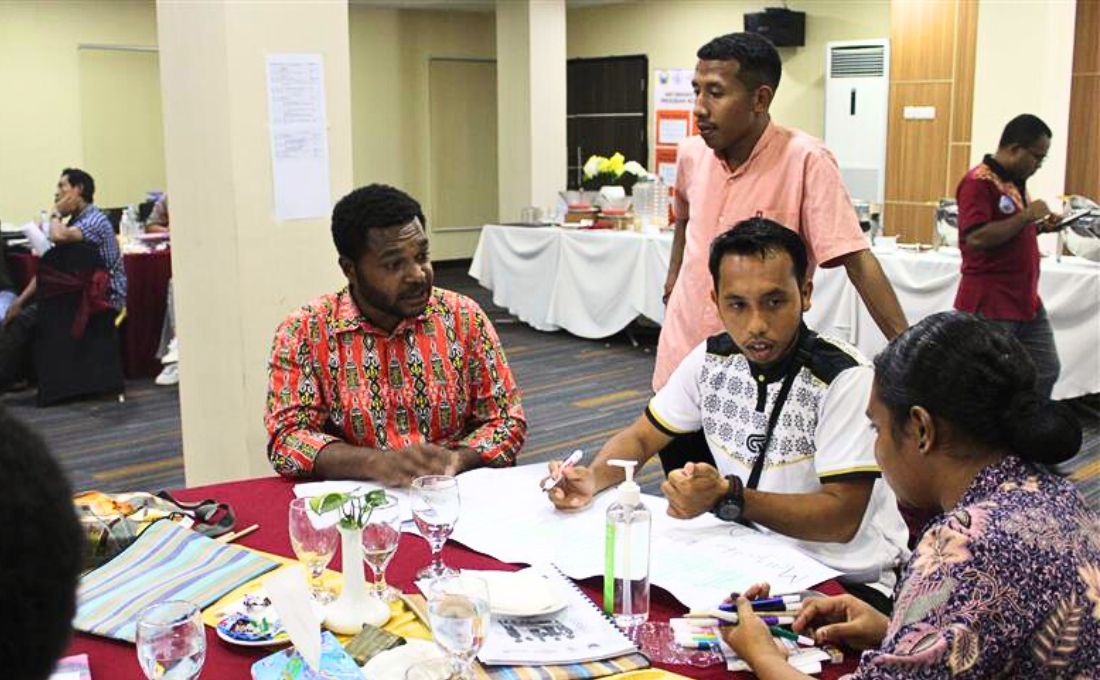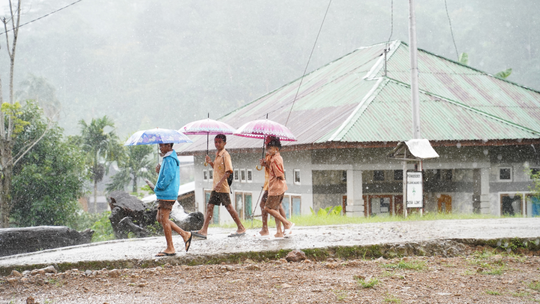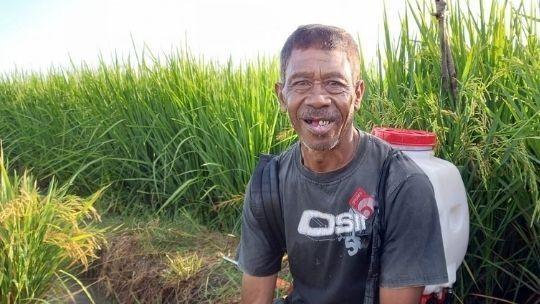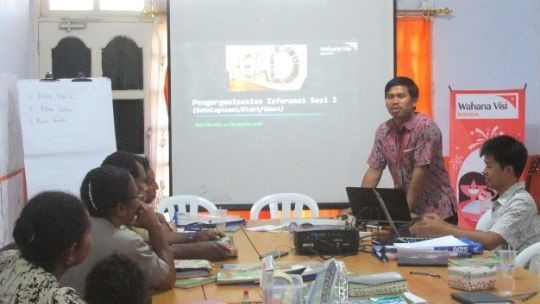The Bridge of Harmony : A Mediator's Tale of Weaving Better Connections

A Hotel Room in Sentani, Jayapura, was filled with the lively sounds of debate and question-and-answer sessions from November 14-17, 2023. This wasn’t a quarrel; the participants were enthusiastically engaged in a mediation training and simulation for community leaders from Jayawijaya and Jayapura, including religious and customary figures, youth, women, and district government officials.
During the training, they learned about understanding social conflict, perspectives, personalities, and the skills of mediators, as well as the mediation process, code of ethics, and negotiation and reframing techniques. This training was organized by Wahana Visi Indonesia through the NOKEN program (Community Transformation for Harmony) in Papua, in collaboration with the GKI Mediation Assistance Center in Tanah Papua, as a step towards creating a safe environment for children.
Thadeus (44), a district head in Jayawijaya, was one of the participants. In addition to being a focus area for the NOKEN program, Thadeus' district had experienced several inter-group conflicts that had hindered community activities, forced people to flee their homes, and resulted in property damage and casualties. "There are still unresolved conflicts between my district and several nearby districts. I think this training is very good and motivating. At first, I was hesitant to attend this training, but it turned out that the material was very beneficial," he said after the training.
When asked about the benefits he had gained, he first described the situation in his region. In the past, the community in his district had attempted to resolve conflicts through deliberation. However, discussions often focused on determining who was right or wrong so that punishment could be imposed on the guilty party. The form and severity of the punishment could vary, depending on the demands of the aggrieved party. This was seen as a way to resolve conflicts, but in reality, it created the potential for future conflicts.
"Even though there was an agreement on punishment, there was still mutual suspicion or distrust when people from the two conflicting groups passed each other. Perhaps because some felt unable or unwilling to accept the imposed penalty. Eventually, when another incident occurred, tensions would rise again. Relationships would become strained once more. The conflict would repeat itself. In fact, the dialogue process had not been completed. There was no real reconciliation," he said.
From the training, Thadeus gained a new perspective. "It would be better if we made peace by encouraging all parties to focus on finding solutions. For example, when paying a fine, we must consider the background and economic capabilities of each party. We cannot make arbitrary demands; we must listen to each other. And most importantly, we must convince each party to open their hearts to peace," he said.
He was optimistic that positive change could occur in his region if there was communication between community leaders. Thadeus planned to strengthen the capacity and relationships of community leaders to build harmony.
On August 1, 2024, along with other district governments, the harmony committee, and NOKEN partner churches, Thadeus presented his experiences in handling conflicts in his district to Tinggal Wusono (54), Assistant I to the Regent of Jayawijaya.
"The NOKEN activities have provided a lot of input on how to handle conflicts and provide understanding to the community. After the socialization that we conducted together with the Church and several institutions, conflicts in our district, which were previously dangerous and had the potential to spread, are now minimal," he said.
Representing the government at the district level, Tinggal Wusono responded, "The general function of government is social mediation, and that function lies with the District Head. We hope that the three District Heads who are being accompanied by NOKEN will become spokespersons for other districts, as they have experience working with the Church and WVI in designing a method to minimize social conflict in the community. District colleagues can provide information independently, so that if this is something good, we can discuss it further at the level of other district heads."
Similar positive benefits were also felt by other participants in Sentani, Papua, such as Bapa John (59). He stated, "After the training, I have resolved 10 problems and recently managed to prevent a murder due to an inter-family conflict. In the past, I used to mediate as best I could, simply inviting the conflicting parties to talk. The mediator training equipped me with good mediation methods and steps, for example, I have to meet with each party first to understand their perceptions and expectations, so that they are more prepared when meeting and talking with the other party to resolve the issue."
Similarly, Irsad (28), a youth member of the harmony committee from Sentani who also serves as the deputy principal for student affairs at a secondary school, said, "The mediator training has been very helpful to me in handling conflicts between students. Usually, I would just call them (the conflicting students) to give them advice, but their conflicts often recurred. After being taught mediation skills, I tried to change my approach, that is, to engage in dialogue, invite them to reflect on their respective perceptions and the impact of their fighting. Once, they were about to take the problem outside the school to attack each other, but thankfully it didn't happen, and the conflict subsided after I invited them to dialogue. In fact, now they are friends and sit next to each other."
After sharing the benefits he had gained from the training, Thadeus conveyed a valuable message, "We must be a bridge. Not only for our own happiness but also for the happiness of others. But we also need to be humble. Peace can be achieved not only because of the mediator. Peace is the fruit of togetherness and cooperation from all parties."
Author: Andina Larasati (MEL Coordinator for NOKEN programme)
Editor: Mariana Kurniawati (Communication Executive)



